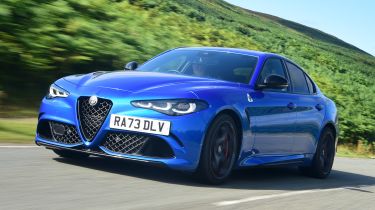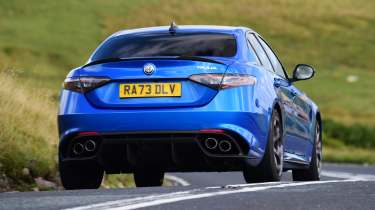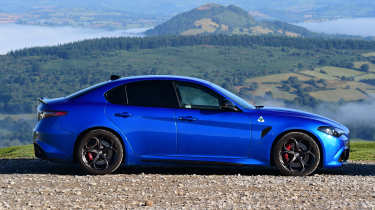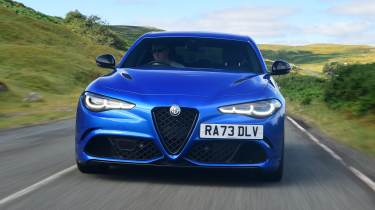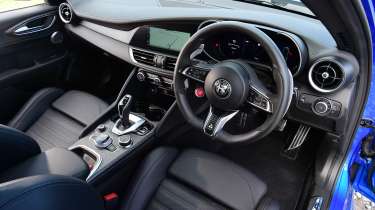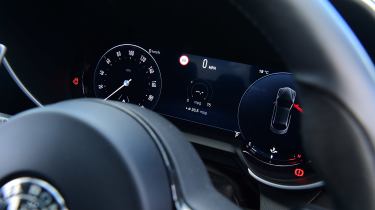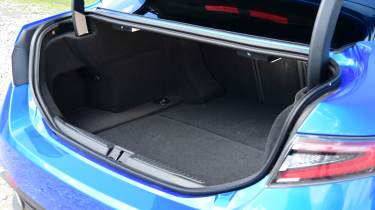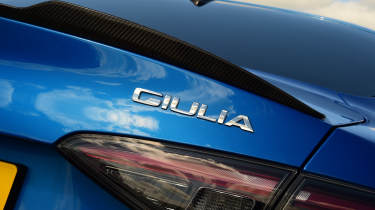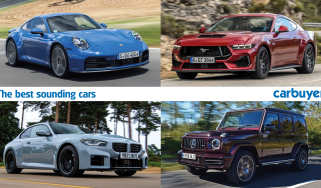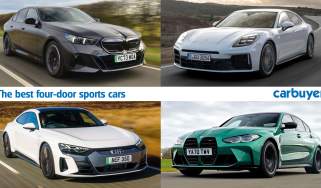Alfa Romeo Giulia Quadrifoglio review – stylish saloon that’s great to drive
“The Alfa Romeo Giulia Quadrifoglio is a thrilling super saloon that seems perfectly set up for UK roads”
Pros
- Stunning looks
- Undercuts main rivals
- Fantastic driving experience
Cons
- Fuel economy
- No estate bodystyle
- Reliability concerns
Verdict – is the Alfa Romeo Giulia Quadrifoglio a good car?
Despite its age, the Alfa Romeo Giulia Quadrifoglio remains one of the very best sports saloons on sale. This latest update has addressed its key flaws – namely its dated interior and build quality – resulting in a car that feels more premium and usable than ever before. Crucially, Alfa Romeo has managed to squeeze more out of the driving experience, too – it turns in sharper, rides even better, and is more than worthy to stand toe-to-toe with the pricier BMW M3.
Alfa Romeo Giulia Quadrifoglio models, specs and alternatives
The Alfa Romeo Giulia is the Italian marque’s upmarket saloon, and the Quadrifoglio is its top-of-the-range performance-focused halo model and answer to the BMW M3 and Mercedes-AMG C63 S super saloons.
The Alfa Romeo Giulia Quadrifoglio has been around for a few years now, but the brand gave the model a nip and tuck for 2024 to keep it competitive and make it even more driver-focused. The overall recipe is only slightly tweaked, though – the super saloon still uses a twin-turbocharged V6 engine with over 500bhp sent to the rear wheels, but there are new matrix LED headlights and improvements to the cabin materials.
Those interior updates couldn’t be more welcome. With a potent power plant, taught chassis and snappy gearbox, the driving experience was always on par with rivals, but the Giulia was let down by an interior that didn’t quite live up to its price tag. For 2024, Alfa Romeo has thrown everything it can at the interior design of the Giulia Quadrifoglio, closing the gap to its rivals in terms of refinement, build quality and equipment.
That being said, you’d still buy the car first and foremost for the performance. That V6 engine is part-developed by Ferrari, and enables 0-62mph in under four seconds and a top speed close to some very flashy supercars. Despite the stats, it feels accessible – not least because there’s so much grip.
More reviews
There’s some distance between the prices of the rest of the Giulia range and the Quadrifoglio but it’s considerably less expensive than the C 63 S. At around £78,000, you’d struggle to spend less and achieve a similar level of performance, while the styling, engine noise and updated interior all help the Giulia’s case.
MPG, running costs & CO2
It should go almost without saying that a car like the Alfa Romeo Giulia Quadrifoglio won’t be very good when it comes to fuel economy, but it’s comparable to most of its rivals. An official figure of 28mpg is slightly lower than pre-facelift models, but it’s practically identical to the BMW M3 and Audi RS5 Sportback – although the Mercedes-AMG C63 S is an outlier with its 40mpg figure, courtesy of its small 2.0-litre engine and hybrid system.
Turn the Giulia Quadrifolgio’s drive-mode selector dial to ‘A’ – for Advanced efficiency – and the V6 can deactivate two of its six cylinders in an effort to save fuel. Stick to this mode on the motorway and – with a very light right foot – it’s possible to see that 28mpg figure creep up.
VED (road tax) will cost £570 the first five times you renew it, and after that it drops to the standard rate. A CO2 output of 229g/km means the top-spec Giulia will never occupy anything other than the top BiK band for company-car users. Alfa Romeo offers a five-year warranty, while service plans are available and can be paid monthly or upfront.
Engines, drive & performance
The Quadrifoglio is head and shoulders above the next-fastest Veloce model in terms of performance, thanks to a stunning 2.9-litre V6 petrol engine. It may not sound like a huge engine, but two turbos and Ferrari know-how means it produces 513bhp. Despite not having all-wheel drive, 0-62mph takes a scant 3.9 seconds, and the Giulia goes without the 155mph speed limiter common on most of its rivals, so can reach 191mph. That’s very nearly supercar pace in a comfortable saloon with room for your friends.
We tested it alongside the impressive Hyundai Ioniq 5 N – that might sound unusual, but with similar acceleration times and power-to-weight ratios the comparison is not as tenuous as you might think. Importantly, though, the all-electric Ioniq 5 N takes a radically different approach to driving fun than the comparatively old-fashioned V6 Giulia Quadrifoglio – while the Ioniq 5 N came out on top overall thanks to the fact that it’s more usable everyday, costs less and yet still has driver focus by way of simulated gear changes, the Giulia Quadrifoglio is still incredibly good fun on B-road blasts. It feels nimbler and more apt for winding UK roads thanks to its more compact dimensions. In an age where electric and petrol power go head to head, it’s really a case of personal preference.
You’ll want to rev the engine out at every opportunity to hear the full chorus. It’s addictive, and can be made even louder with an optional Akrapovic sports exhaust system, which is also a tad lighter than the standard set of pipes.
The automatic gearbox is the same unit used in the BMW M3 and swaps cogs snappily, both by itself or manually with the aluminium gearshift paddles, although the German saloon does so with even less delay.
It’s some achievement to make a rear-wheel-drive car with more than 500bhp feel so accessible but the Giulia’s chassis does just that. The rear end can swing out if that’s your intent but there’s a huge amount of confidence-inspiring traction thanks to a new mechanical limited-slip differential. The old electronic differential was never as predictable as we’d have liked, but its replacement feels far more adept at metering out power to the tarmac.
Both the steering and the car’s weight are light compared to rivals, which means it turns in keenly and isn’t unstuck by tricky mid-corner bumps. There’s little body roll, while tweaks to the electronically-adjustable suspension have improved the Giulia’s ride quality in its comfiest setting, and sharpened up the steering and body control in its sportiest mode. It copes with broken tarmac and bumps with ease, giving the impression it was fine-tuned with British roads in mind.
Interior & comfort
We mentioned how comfortable the Giulia Quadrifoglio is in the last section and refinement has also been improved by extra sound-deadening and a reduction in vibrations. It’s more than happy to perform long-distance GT duties, soaking up lots of miles when you’re not exploring everything the engine has to offer.
But most apparent for the facelift is the improvement in build quality, which at last feels up to scratch for a car of this price. The cheap-feeling plastic trim in previous Giulias has been replaced by carbon fibre, while the 12.3-inch central infotainment touchscreen is intuitive and far easier to use than the old system. The new digital driver’s display has more functionality than the old analogue gauges, too, and brings the Giulia up to date on the tech front.
As the flagship model in the Giulia range, the car gets plenty of standard equipment; the Giulia Quadrifoglio brings LED matrix headlights, 19-inch alloy wheels, active suspension and wireless phone charging. All the new interior carbon fibre is standard-fit, unlike most rivals, as is the 14-speaker Harman Kardon stereo.
The new touchscreen shows driving stats and the display for the reversing camera, while connectivity is taken care of with Apple CarPlay and Android Auto. Options include sportier Sparco bucket seats and a Driver Assistance pack, plus costly performance-focused extras like the sports exhaust system and carbon-ceramic brake discs.
Practicality & boot space
Those in the front seats are very well catered for, both in terms of tech and space. This is pretty common for saloons but the Giulia offers plenty of space for rear-seat passengers too. With a longer wheelbase than any of its rivals, legroom is generous, and headroom is good despite the sloping roofline.
The Giulia Quadrifoglio might have lots more power than the cheapest model but practicality isn’t affected at all. Boot space is identical at 480 litres, which handily matches the BMW M3 and beats the Mercedes-AMG C 63 S. As it’s a saloon, you haven’t got a huge boot opening, and this isn’t helped by a high lip to haul items over. Its rivals – even the BMW M3 – are available as an estate, but Alfa Romeo doesn’t sell a Giulia estate. Those that need the versatility of a full tailgate will prefer the Stelvio Quadrifoglio SUV, which packs the same powerful V6 engine.
Reliability & safety
Alfa Romeo performed better than you might expect in terms of customer satisfaction in the 2024 Driver Power owner surveys, especially given its worse-than-average reliability stats. The company came in 13th place out of 32 brands, though 26% of Alfa Romeo owners reported an issue with their car in the first year. The brand has a loyal fanbase, however, and they like how its cars drive, while also rating its safety systems highly.
Euro NCAP gave the Giulia a five-star rating when tested in 2016, and this applies to the Quadrifoglio too. Adult protection was especially impressive, with a 98% score. Autonomous emergency braking, pedestrian detection, blind-spot monitoring and lane-departure warning are all fitted as standard. The £1,500 Driver Assistance Pack Plus option adds a driver attention alert warning, traffic jam assistance, intelligent speed control and adaptive cruise control.
